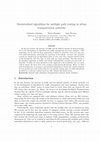Papers by Ludovica Adacher

The supply chain is a worldwide network of suppliers, factories, warehouses, distribution centers... more The supply chain is a worldwide network of suppliers, factories, warehouses, distribution centers, and retailers through which raw materials are acquired, transformed, and delivered to customers. Due to the dynamic fluctuation of customer demands and raw material availability in the global market, manufacturing enterprises are facing difficulties in rapidly responding to market changes. To face this complexity, it is useful to approach the global scenario through a local optimization problem where the interaction with the external variables and other agents is modeled as a stochastic environment. So a simplified discrete time continuous state Markov model of the uncertain scenario characterizing the operation of a retailer node is developed in this paper and an algorithm to control it is presented and compared with other policies known in literature. Numerical examples illustrate the operation of the proposed algorithm
We present a negotiation paradigm for a simple Supply Chain (SC) model, to improve the performanc... more We present a negotiation paradigm for a simple Supply Chain (SC) model, to improve the performances in terms of bullwhip effect reduction, under a cooperative and a competitive scenario. In the case of a single frequency perturbation in the nominal demand, analytical results showed that cooperation among the sites is beneficial for the SC performances. In the case of multiple frequency perturbations this has been described through numerical examples, which confirm the analytical findings of the single frequency case.
In this paper we deal with the problem of scheduling aircrafts maneuvering on ground in the speci... more In this paper we deal with the problem of scheduling aircrafts maneuvering on ground in the specific case study of Malpensa Airport. Given a fixed route and a landing/take off time instant for each landing/departing aircraft, we consider three objective functions in the following lexicographical order: (i) the minimization of the number of tardy aircrafts; (ii) the maximization of the safety; (iii) the minimization of pollution and noise. Problem constraints are related to the safety rules. We model the problem as a job-shop scheduling problem. We develop heuristic procedures based on an alternative graph formulation of the problem to construct and improve feasible solutions. Experimental results based on real data and analysis are reported.

In the last decades, the increase of traffic and the limited capacity of urban networks, led to t... more In the last decades, the increase of traffic and the limited capacity of urban networks, led to the development of algorithms for traffic management and route guidance. GPS technology can be used for fleet monitoring in urban or suburban areas and may provide useful information concerning the movement of all vehicles. Current route guidance systems are simple from an algorithmic point of view, since they compute shortest paths to the destination, but they have to deal with very large networks. For this reason, a decentralized approach, in which each vehicle independently calculates its own route, is desirable. Usually, the main drawback of this approach is the possibility that too many vehicles choose the same route, thus causing oversaturation phenomena. Hence, to allow path diversification, we propose a decentralized algorithm in which each vehicle computes its own satisfactory route on the basis of (i) its specific settings and (ii) traffic information provided by a reference station based on other vehicles forecasted routes.
International Journal of Manufacturing Research, 2009
ABSTRACT In this paper Lagrangian-based distributed algorithms for scheduling jobs on unrelated p... more ABSTRACT In this paper Lagrangian-based distributed algorithms for scheduling jobs on unrelated parallel machines are presented. In these algorithms, the scheduling process is the result of a cooperation process among several Decision Makers (DMs). DMs have a local knowledge of the system, and the possibility to decide which type of information to exchange each other. Our focus is to investigate the performance of different algorithms based on different knowledge degrees of the parallel machine system. The implementation issues and the effectiveness of the algorithms are analysed via simulation, in which problem instances with job dynamic arrivals are also considered.
Page 1. A planning and Ludovica Adacher Dipartimento di Informatica Automazione routing model for... more Page 1. A planning and Ludovica Adacher Dipartimento di Informatica Automazione routing model for the integrated supply chain management * Paolo Detti Carlo Meloni ... Decomposition methods fall into two main categories; price directed and resource directed. ...
Iie Transactions, 2000
This paper investigates possible implementations of the autonomous agents concept in¯exible manuf... more This paper investigates possible implementations of the autonomous agents concept in¯exible manufacturing control. The implementation issues and the eectiveness of dierent control architectures and algorithms are analyzed by means of a simulation model of a¯exible job shop. Extensive experimental results are reported, allowing the evaluation of the trade-o between the degree of autonomy and system performance. 32, 941±951
Iie Transactions, 2000
This paper investigates possible implementations of the autonomous agents concept in flexible man... more This paper investigates possible implementations of the autonomous agents concept in flexible manufacturing control. The implementation issues and the effectiveness of different control architectures and algorithms are analyzed by means of a simulation model of a flexible job shop. Extensive experimental results are reported, allowing the evaluation of the trade-off between the degree of autonomy and system performance.











Uploads
Papers by Ludovica Adacher